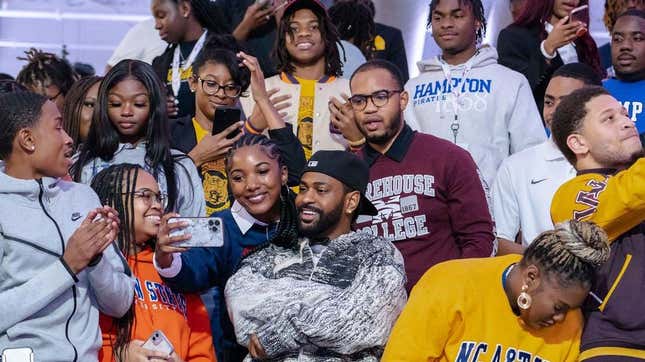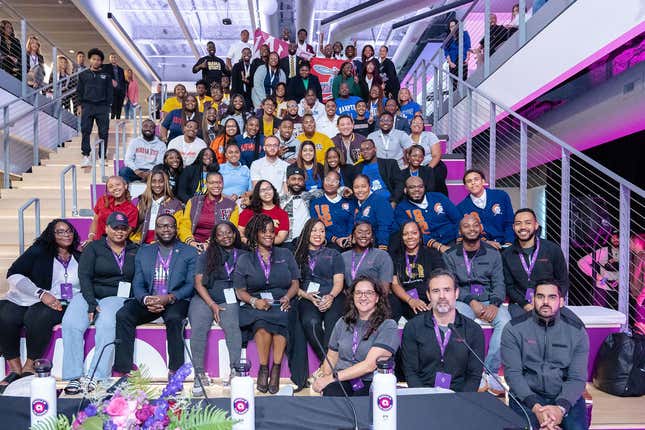
Big Sean is a man of the people. No matter where he has been in his career, the Detroit rapper has always expressed his commitment to helping those in need. It started off in Detroit, now he’s taken that mission worldwide thanks to his Sean Anderson Foundation.
Between Sept. 15 and 18, Ally Financial, in collaboration with the Thurgood Marshall College Fund and the Sean Anderson Foundation, hosted the fourth annual Moguls in the Making entrepreneurial pitch competition. More than 60 students from 15 HBCUs across the country converged in Charlotte, N.C., to create solutions “to address economic mobility challenges using vital business skills.”
Instrumental in the launch of the competition in 2019, Big Sean came to the competition to not only see students’ business ideas come to life but to also offer his advice and support to the students who were present.
The multi-platinum artist spoke to The Root about having a nationwide impact on the next generation of college students, the importance of helping children at HBCUs and lessons he’s learned from his business ventures that he can pass on to students. Plus, since this is Big Sean, we had to ask him about the Detroit rap scene.
The Root: You started the Sean Anderson Foundation in 2012. Did you ever think you would get to the point where you would have the influence to help students nationwide and not just in Detroit?
Big Sean: That was always the goal. You always have to change your community and start with where you’re from. That’s something I learned from my grandma, who was always charitable. She set the foundation for how I should give back. No matter what she had going on, even if she had a bad or good year financially, she always made sure she donated to the charity she believed in, and she thought that giving back was just as important as receiving anything. I treat it just like how I would if I was making an album or other music.
I always make sure that we’re doing stuff for the community with our programs and continuing to expand. When I got a chance to link with Ally Financial and the Thurgood Marshall College Fund for Moguls in the Making, it was an opportunity to teach kids about financial literacy and how to work together on a team. You’re going to come across a lot of genius minds that have never had the opportunity to be put through that kind of test. It’s just an honor to expand beyond Detroit and be worldwide.
TR: I’m sure you consider yourself a business mogul. What have you learned from your business ventures that you can pass on to students?
BS: One of the things I could pass on is just how important the journey is and how much of a learning process life is in general. You can’t be so hung up on what you consider success and what you consider failure because once you look back on it, you realize the things you thought were failures, were just amazing moments and wins in a different way. It prepared you for the next opportunity or made clear the runway for something even better than you ever expected. You take that experience and wisdom and apply it to what you have going on now. Always make sure that you treat people with respect. Don’t ever prioritize one person because I’ve seen people go from intern to CEO. Be who you are and be righteous.

TR: As a Black man, can you also speak to the importance of supporting and helping kids attending HBCUs?
BS: HBCUs are legendary. A lot of my family members went to HBCUs such as Morehouse, Howard, Clark [Atlanta] and other schools sprinkled throughout my family. I went on an HBCU college tour myself because it’s just so interesting. People who go to HBCUs are some of the most important minds in this world because of what they get to experience, there’s a historical aspect to it. I think it’s just something to never lose sight of and to always highlight and be a part of. They make some of the most gifted, creative and amazing people. That’s why I always wanted to figure out how I can work with HBCUs and this was this perfect outlet and opportunity.
TR: If you went to college, which HBCU would you go to?
BS: I was considering going to Morehouse and Howard. I had a lot of friends that went to school at [Tennessee State University]. But probably Morehouse or Howard.
TR: What’s the importance of having Black students pursue a career in other fields? Such as business, sports, tech, etc.? How do the Sean Anderson Foundation and Moguls in the Making help students discover their passions?
BS: A lot of people have to step out of their comfort zone and get a chance to express themselves in any way possible. The world is changing so rapidly that there are new ways to express yourself. There are new ways to monetize and work together. I just did a “give back” in Detroit where we created an E3 Video Game lab teaching kids how to monetize off of playing video games. Who would’ve ever thought? I’m sure when I was growing up my mom was like, “Yo, you need to put the video games down!” because there was nothing in that. Now, some of these people are making millions of dollars playing video games. That’s just one of the thousands of ways the world has changed. That’s why I think this competition is so important because it asks the question of how you can affect the community using the business skills you’ve learned
TR: What’s your favorite rap album from a Detroit artist this year?
BS: I’m really liking Peezy’s last album, ONLY BUILT 4 DIAMOND LINKS, that just dropped. I also like Icewear Vezzo’s last album, Rich Off Pints 3. Those were a couple of my favorites. Babyface Ray, the last album he dropped, FACE, was crazy too. These are my guys. They’ve been doing it for so long and it’s just beautiful to see things turning up for them.
TR: What about Boldy James?
BS: Oh my god! The way he was rapping on his last album, Killing Nothing, I never heard him rap like that. It was like new lingo in every song. Just the way he was attacking every beat ya know? I was loving it man. That’s my dog too.

